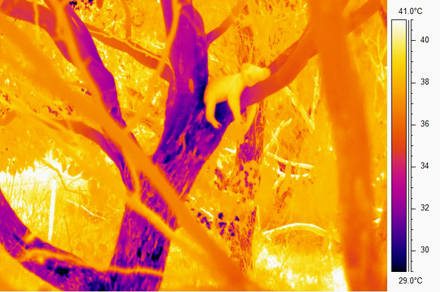Please note: Osher Rainforest will be closed for maintenance Jan. 14–16.
Science News
Cooling Koalas
June 9, 2014
by Molly Michelson

As the temperature rises this summer, we’ll all try and look for a cooler place to hang out. Whether you’re a Bay Area denizen—or a more southerly-situated koala!
Koalas are a little different from us, however. Most importantly, they don’t sweat; instead, they often lick their fur to stay cool. But that can lead to dehydration. In fact, heat waves in their native Australia can hit the marsupials hard. In 2009, a koala population in New South Wales lost about a quarter of the animals to heat.
Koalas are arboreal and frequent the shade in the eucalyptus trees that also provide the animals their leaf diet. When scientists focused on a group of 30 koalas, however, they witnessed the animals changing to acacia trees as temperatures soared above 35° Celsius (95° Fahrenheit). Why move in the heat? What was the difference in the trees?
Researchers used a portable weather station on a long pole to measure what the koalas were experiencing in the two trees. Thermal imaging confirmed that acacia trees that can be more than 5°C (9°F) cooler than the air during hot weather. In addition, instead of just sitting in acacia—as the koalas do in eucalyptus trees—the researchers found the koalas rest up against the tree trunks in acacias.
“When we took the heat imagery it dramatically confirmed our idea that ‘tree hugging’ was an important cooling behavior in extreme heat,” says Michael Kearney, of the University of Melbourne. “The availability of cooler trees should be considered when assessing habitat suitability under current and future climate scenarios.”
“Access to these trees can save about half the water a koala would need to keep cool on a hot day,” says lead researcher Natalie Briscoe, also from the University of Melbourne.
And perhaps other animals hug trees to stay cool. “Cool tree trunks are likely to be an important microhabitat during hot weather for other tree dwelling species including primates, leopards, birds and invertebrates,” Kearney says.
The study was published last week in Biology Letters. And if you’re feeling a little overheated this summer, maybe try hugging a tree?
Image: Natalie Briscoe